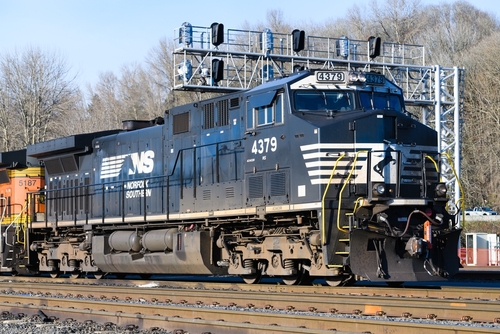
The Federal Railroad Administration (FRA) on Friday initiated 12 enforcement cases with 117 counts against Norfolk Southern Corp. and other entities involved in the railroad company’s train derailment last year in Ohio that spewed hazardous chemicals for miles following an unnecessary vent and burn.
“Norfolk Southern’s train derailment in East Palestine was a wake-up call to the country and should be to the freight rail industry that the status quo is unacceptable when it comes to rail safety,” FRA Administrator Amit Bose said in a statement. “We must all be more vigilant and advance new measures that will keep people working on, living near, and traveling along railroads out of harm’s way.”
The potential violations are part of the FRA’s Accident Investigation Summary Report released July 19 on the Norfolk Southern train derailment on Feb. 3, 2023 in East Palestine, Ohio. The FRA investigation was conducted as part of a comprehensive response from the U.S. Department of Transportation (DOT) that began within hours of the derailment.
The FRA said that its initiation of the 12 enforcement cases is an important step and one of several ways that the DOT is taking actions to ensure accountability and improve railroad safety.
“Our department’s work began within hours after the derailment in East Palestine — supporting first responders and investigating the incident alongside the NTSB’s independent review — and today, we are clear-eyed about its cause and what must be done to prevent similar incidents in the future,” said U.S. Transportation Secretary Pete Buttigieg.
Specific details about the enforcement cases and counts were not included in the FRA accident summary, but it does say that the potential violations determined by the FRA were found across technical disciplines examined by the agency’s inspections, such as operating practices that ensure internal railroad rules are communicated to workers and followed, as well as motive power equipment, which includes mechanical elements like locomotives and freight cars.
Once an enforcement case is initiated by the FRA, a civil penalty proceeding starts by serving a notice of probable violation on the person/entity accused of violating federal railroad safety or hazardous materials transportation regulations. The FRA’s chief counsel makes initial penalty assessments using specific guidelines, and the FRA can amend the notice of probable violation before issuing an order assessing a civil penalty.
Once penalties are assessed, the railroad will have time to investigate the charges. Larger railroads may present their case in an informal settlement conference with the FRA that also may also include lawyers and technical experts from both parties.
Final report findings
Among its findings, the FRA determined in its derailment investigation that the event was caused by a roller bearing that failed due to overheating, consistent with the findings released June 25 by the National Transportation Safety Board (NTSB), an independent federal agency.
The FRA also found, as did NTSB, that Norfolk Southern’s “procedures and the inadequate staffing for communicating information” may have contributed to the accident.
According to the accident summary report, the FRA said it examined all the available evidence to ensure compliance with federal regulations.
“FRA has issued new rules and drawn attention to safety concerns, conducted safety audits, and secured the participation of major Class I railroads and their union workers, including Norfolk Southern — the first Class I freight railroad to currently participate in the agency’s Confidential Close Call Reporting System — among other actions, and we will not stop in pursuit of our top priority: safety,” Bose said.
Specifically, the FRA found that Norfolk Southern’s procedures and its inadequate staffing for communicating information from the Hot Box Detectors (HBDs) to the train crew may have contributed to the accident.
HBDs are a type of wayside detector installed along the railroad right-of-way that monitors the condition of freight and passenger rolling stock, according to the FRA, which does not currently regulate the location, installation, operation, or maintenance of wayside detectors, unless a detector interfaces with a railroad’s signaling system.
However, this is a topic where FRA will aggressively use its existing authorities but encourages Congress to also act in any future rail safety legislation, according to its report.
The FRA’s investigation also delved into the hazardous materials being transported in the Norfolk Southern train to ensure compliance with all required documentation, package marking, labeling, and emergency response information requirements, as well as the use of a general-purpose DOT-111 specification tank car to transport butyl acrylate, a flammable liquid.
The DOT-111 tank cars were breached in the derailment and the FRA found that such use contributed to the severity of the accident because they were not equipped with a jacket, tank head puncture resistance system, or thermal protection system, the report says.
In addition, while the FRA’s final report noted the recommendation made by Norfolk Southern and its contractors to execute a vent and burn procedure, it said only that “FRA neither made, directed, nor participated in the decision to conduct a vent and burn operation, and the agency has no role or authority in such a decision.”
Bose is likely to discuss more details about the FRA’s investigation and report during a rail safety hearing being held tomorrow (July 23) by the U.S. House Transportation and Infrastructure Railroads, Pipelines, and Hazardous Materials Subcommittee, entitled “Examining the State of Rail Safety in the Aftermath of the Derailment in East Palestine, Ohio.”
He will be joined by NTSB Chair Jennifer Homendy, Pipeline and Hazardous Materials Safety Administration Deputy Administrator Tristan Brown, and three other participants who are scheduled to testify during the hearing.
Lawmakers are expected to question them on industry best practices, as well as call for bipartisan support for legislation that would further promote safety and freight connectivity.
“We are taking action on the NTSB’s recommendations, but we also now need Congress to do its part to enhance rail safety and hold the railroads accountable by passing much-needed legislation,” Buttigieg said last week.